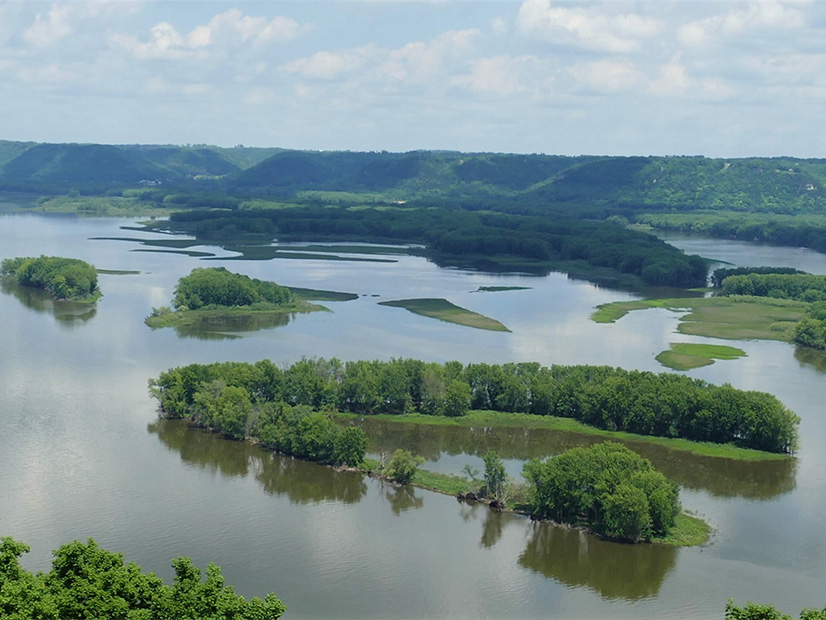The Wisconsin Supreme Court last week ruled that a former state regulator’s encrypted messages with power line developers did not amount to a serious risk of bias during the controversial Cardinal-Hickory Creek line’s permitting process.
In a 4-3 opinion July 7, the court’s conservative majority undercut a lawsuit brought by conservation groups that challenged the line’s permitting process before regulators in 2019. The court ruled that former Wisconsin Public Service Commissioner Mike Huebsch does not have to testify or turn over his phone after he used a software app to exchange covert messages with an American Transmission Co. (ATC) employee and a former independent contractor for ITC Midwest.
ATC and ITC Midwest, the project’s co-owners, last year uncovered evidence of years’ worth of encrypted messages between Huebsch and their employees. As a result, the companies redid the project’s certificate of public convenience and necessity to avoid improprieties. (See Former Wis. Commissioner’s Texts Imperil Cardinal-Hickory Creek Line.)
The court kept its decision focused on Huebsch’s conduct and didn’t address the merits of the PSC’s unanimous approval of the $500 million, 101-mile, 345-kV Cardinal-Hickory Creek line. It said Huebsch didn’t violate the line’s opponents’ due process and rejected the conservation groups’ subpoena for an inspection of Huebsch’s cellphone.
The court also said a lower court erred when it rejected Huebsch’s motion to quash the subpoena. It remanded the case back to the Dane County Circuit Court.
Penning the majority’s opinion, Chief Justice Patience Roggensack said the Driftless Area Land Conservancy (DALC) “allegations of bias do not come close to the level of alleging a cognizable due process claim.” The high court described the accusations of bias against Huebsch as “meritless,” based on “absolutely no factual evidence” and “borderline frivolous.” It said that public servants are presumed impartial unless there’s solid evidence to the contrary.
Conservative justices also said that the nation needs strengthened interstate transmission and said Cardinal-Hickory Creek enjoys “widespread support from labor, industry, business groups, environmentalists, Republicans and Democrats.”
Howard Learner, executive director of the Environmental Law and Policy Center, represents conservation groups DALC and the Wisconsin Wildlife Federation in the fight against the line. He said he was disappointed that the state supreme court “overreached in holding that Wisconsin law prevents conservation and consumer groups from taking discovery into the hundreds of phone calls, secret text messages, lunches, dinners and golf dates between … Huebsch and senior executives for the transmission companies that proposed this costly high-voltage transmission line.”
“Allowing these kinds of improper communications without any recourse under state law undermines public confidence in the fairness and integrity of Wisconsin’s utility regulatory process,” he said in an emailed statement to RTO Insider.
Learner said he agreed with the court’s liberal minority and said the four conservative justices “bent the judicial rules to provide special treatment in protecting improper conduct by their political ally.”
The liberal justices wrote in a dissent that “if our government is truly one of laws and not men and women, then we cannot use extraordinary constitutional powers to carve out special treatment for ourselves and only persons like us.” They said the majority justices’ “indulgence in the excesses of judicial power is not grounded in law and serves only to deepen inequalities in our system of justice.”
ATC and ITC issued a statement saying they appreciated the Supreme Court’s “thoughtful decision.” They celebrated the end of a “contrived fishing expedition that the project’s opponents orchestrated against former Commissioner Huebsch.”
“With the case now remanded back to the Dane County Circuit Court, the co-owners look forward to successfully concluding the litigation on the merits of the Public Service Commission of Wisconsin’s September 2019 decision to approve the project,” ATC and ITC said in an emailed statement.
Huebsch’s attorney Ryan Walsh told Wisconsin Public Radio that the ruling makes clear that there “shouldn’t be fact-finding into the personal lives of judges and judicators without rock-solid evidence that something inappropriate has happened.” Walsh said the decision ended a yearslong “cloud” hanging over his client.
Learner pointed out that the line is still set to cut through a protected wildlife refuge. A federal judge earlier this year blocked construction of the line through Upper Mississippi River National Fish and Wildlife Refuge. (See Federal Judge: Tx Line Can’t Cross Wildlife Refuge.)
ATC and ITC are appealing that decision before an appeals panel this fall. In the meantime, the companies continue to clear-cut the original route up to the protected refuge area. ATC and ITC report that they have nearly completed a segment in Iowa and are continuing construction in western Wisconsin.
With the matter of Huebsch’s texts decided at the state level, the DALC vowed to continue the fight against the project at the federal level.
Learner said a “fair review of the evidence will show that there are better, more cost-effective, more environmentally sound, and more flexible alternatives for reliable clean energy in the Wisconsin Driftless Area.”
ATC and ITC estimate that 127 renewable generation projects comprising about 19 GW of capacity are currently dependent on the line’s completion.
“Utilities across our region are depending on the Cardinal-Hickory Creek project to facilitate the region’s transition away from fossil fuels and support decarbonization goals,” the companies said. “The critical role of this project in meeting the region’s energy needs compels the co-owners to ensure it is built for the benefit of electric consumers by the scheduled in-service date of December 2023.”
The Cardinal-Hickory Creek line is the last of MISO’s $6.7 billion, 17-project Multi-Value Project portfolio approved in 2011.




